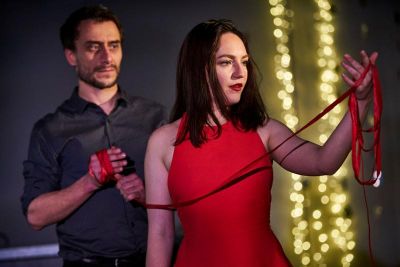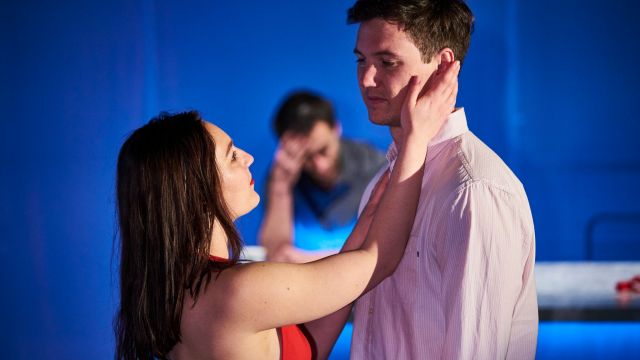Julie
Why and how do you re-imagine a classic of its period? Holly Brindley took on this challenge, commissioned by Foul Play, and has written the best new version of Miss Julie I have seen or read. Julie comes alive, becoming relevant for audiences in this new production. Once again Strindberg’s creation has the power to engage and challenge an audience.
Strindberg’s plays shocked audiences for two reasons. The first was the content and the second was the presentation. Strindberg departed from the comforting evening out that theatre was formerly considered and dealt with real people in real situations. He also changed the painted scenery and fantasy for real furniture in real rooms, while people talked as they really would in these situations. Audiences were shocked with this new “naturalistic” theatre. However, time has passed, we live very differently and things that had the power to provoke and shock in their time are taken for granted nowadays.
Brindley and director Yasmin Gurreeboo’s production is true to Strindberg in two important ways. Firstly, the setting designed by Meg Wilson is a believable space for a party and is up close and personal, with the debris from the celebrations washing around the feet of the audience. There is no escape from this room and with actors close enough to touch, it confronts in a manner similar to the way in which 19th century audiences were affected by the original production of Miss Julie. Secondly, it centres on Julie and her state of suspended adulthood, hovering between the choices that threaten her. Brindley, Lucia Van Sebilie (Julie) and Gurreeboo have delivered a Julie that we recognise in ourselves.
 We meet Julie at the end of the party, dancing uninhibitedly, happy, high on the fun of the evening and too much alcohol. Gradually we are introduced to the other characters. Christine, brilliantly played by Emma Beech, is weary, conscientious and wise. She knows that this could all end badly and Julie needs to go to bed- to sleep – now! Beech’s physicality was fabulous and had the audience laughing and sympathising with her. Haven’t we all been there, the sober, often ignored person who knows that the vomit in the bathroom needs to be cleaned up and the hangovers in the morning will only get worse the longer you stay up?
We meet Julie at the end of the party, dancing uninhibitedly, happy, high on the fun of the evening and too much alcohol. Gradually we are introduced to the other characters. Christine, brilliantly played by Emma Beech, is weary, conscientious and wise. She knows that this could all end badly and Julie needs to go to bed- to sleep – now! Beech’s physicality was fabulous and had the audience laughing and sympathising with her. Haven’t we all been there, the sober, often ignored person who knows that the vomit in the bathroom needs to be cleaned up and the hangovers in the morning will only get worse the longer you stay up?
One of the reasons this script works is because Brindley has split Jean’s role in the original play into two roles, John, played by Nick Bennett, and Tom, by Doug Mowbray, and this division is symbolic of two of the choices available to Julie. John has the advantage of long time knowledge of Julie, which allows for familiarity and manipulation. It is also an unequal relationship; age and his relationship to Julie, given to him by an absentee father. Tom is young, good-looking, fun and interested in Julie, who is interested in him but scared of stepping out of her world into the seemingly dangerous one he inhabits. Both Julie and Tom are still living at home, with all the advantages and none of the responsibilities.
Re-reading the original script when I got home reinforced for me how clever Brindley has been in the way she has transposed the long speeches of Strindberg into the fast-paced to and fro of the contemporary conversations between the four characters. Cutting straight to the heart of Strindberg’s exploration of Julie on the brink of making decisive life choices, it retains the angst and leaves out the lectures.
Foul Play is a company that deserves to do well and be supported. It has produced an excellent piece of professional theatre that matches and surpasses its well-funded peers. Go along and support this piece of theatre.
Sally Putnam
Images: Julie (Lucia Van Sebille & Tom (Doug Mowbray), and Julie (Lucia Van Sebille) & John (Nick Bennett).
Subscribe to our E-Newsletter, buy our latest print edition or find a Performing Arts book at Book Nook.

